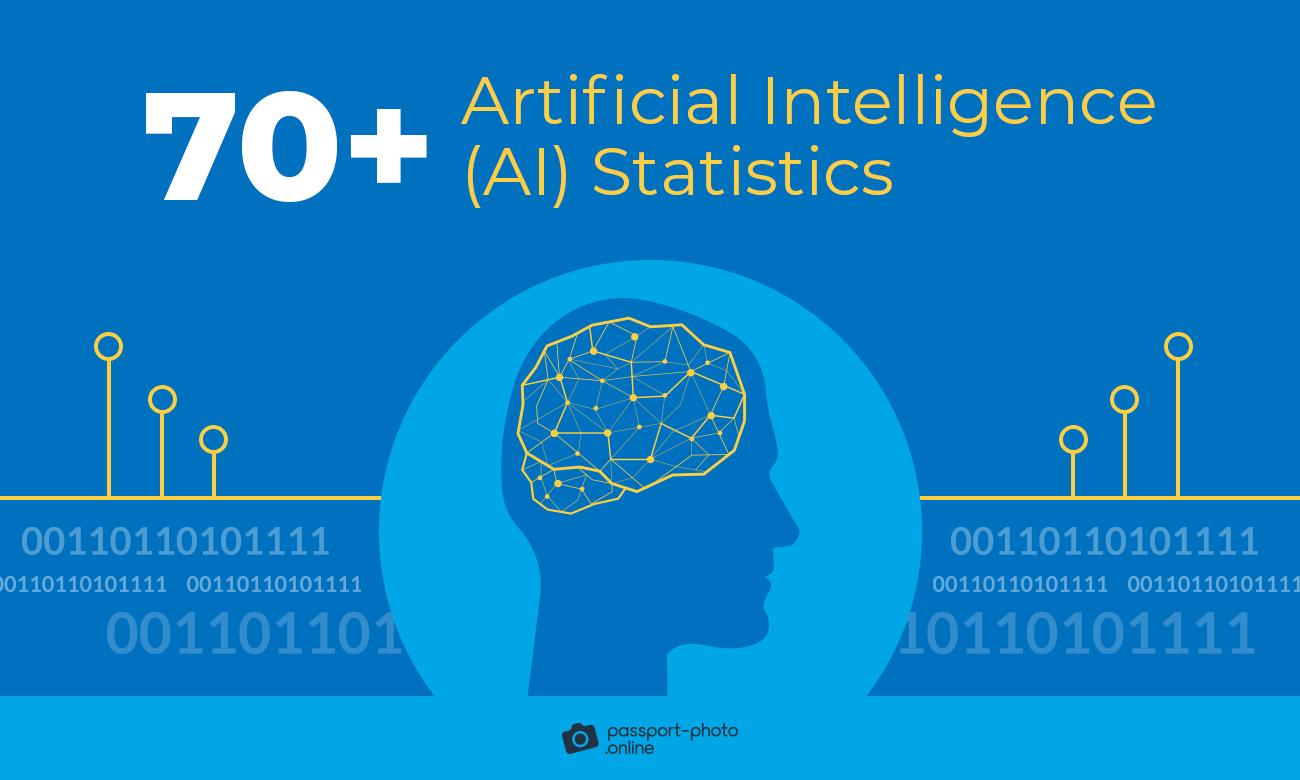Artificial intelligence is transforming every industry.
This 2026 stats roundup cuts through the noise with hard numbers on AI’s market growth, business impact, workforce disruption, consumer sentiment, and future trends.
Every stat is sourced, current, and curated to help you stay ahead.
Top AI Statistics You Should Know in 2026
- The global artificial intelligence market was valued at $390.9B in 2025 and is projected to reach $3.5T by 2033, growing at a 31.5% CAGR.
- 45% of organizations believe AI will improve remote work.
- 44% of companies that implemented AI report a reduction in business costs.
- Almost nine out of 10 organizations (87%) believe AI will give them an edge.
- Over half of executives (54%) say AI has increased productivity in their businesses.
- 38% of US jobs might be at high risk of automation by the early 2030s.
- Between 75 and 375M employees will have to reskill and change careers by 2030.
- Seven in 10 consumers believe AI can make their lives better.
Fun Facts about Artificial Intelligence
- Netflix’s recommendation system generates about $1B in annual revenue.
- Sam Altman said one million people signed up for ChatGPT within an hour of launching its viral image-generation feature.
- OpenAI’s generative AI tools reached over 100M users in just two months.
- 44% of people would get in a self-driving Uber car if it came to pick them up.
- IBM’s AI can predict which employees will quit with 95% accuracy.
- Most people (~60%) think they can spot an AI-powered chat from a mile away.
- Persado’s AI system made ads for JPMorgan that generated 2–5 times more unique clicks than those created by human copywriters.
- Seven in 10 consumers harbor some fear of AI, and a quarter worry that machines will take over the world.
AI Market
- Between Sept 2024 and Sept 2025, ChatGPT held an 81.12% market share, followed by Perplexity at 10.85% and Microsoft Copilot at 4.04%.
- By 2030, AI is expected to add up to $13T to the global economy.
- Globally, the US leads the AI market, projected to reach $47B in 2025.
- In 2024, US institutions led globally with 40 notable AI models, far ahead of China’s 15 and Europe’s three combined.
- Global corporate AI investment reached $252.3B in 2024, driven by a 44.5% surge in private funding and a 12.1% increase in M&A activity since 2023 (over 13 times higher than in 2014).
- In 2024, US private AI investment reached $109.1B—about 12 times China’s $9.3B and 24 times the UK’s $4.5B.
- In 2024, generative AI drew $33.9B in global private investment, up 18.7% from 2023.
- Accenture estimates AI could add $461B in value to the global healthcare system by 2035, pushing it beyond $2.26T.
- The global generative AI market reached $37.9B in 2024, up $32.4B since 2020. It’s projected to grow by another $404.2B by 2031.
- The global machine learning market reached $77.1B in 2024, up $27.6B since 2020. It’s projected to grow steadily by $491.2B between 2024 and 2031.
- The global natural language processing market reached $39.8B in 2024, up $26.4B since 2020. It’s expected to grow by $161.7B between 2024 and 2031.
- The global AI robotics market surpassed $17B in 2024, up nearly 30% from 2023. It’s projected to reach about $100B by 2031, growing around 20% annually.
AI vs. Business: Stats & Facts
- In July 2024, 78% said their organizations used AI in at least one business function, up from 72% earlier that year and 55% in 2023.
- About 83% of executives see AI as a strategic priority for their businesses.
- By 2035, AI is expected to boost business productivity by up to 40%.
- About 95% of recruiters believe AI can greatly improve talent acquisition and retention.
- Experiments found AI assistance boosted developer task completion by an average of 26.08%.
- Since GenAI’s rise in 2022, productivity in AI-exposed industries like finance and software has nearly quadrupled, climbing from 7% (2018–2022) to 27% (2018–2024). In less AI-exposed sectors like mining and hospitality, it slipped from 10% to 9%.
- Seven in 10 companies today use ML.
- 86% of workers say AI has become a mainstream technology.
- 43% of executives believe AI tech will transform their organizations in the next 1–3 years.
- Three in four C-suite executives believe they might go out of business if they don’t scale AI in the next five years.
- India leads in AI adoption, with 91% of workers using it and 81% trusting it. In contrast, only 39% use AI and 33% trust it in the Czech Republic.
The Impact of Artificial Intelligence on Employment
- The World Economic Forum estimated AI would replace about 85M jobs by 2025.
- In 2024, AI-skilled workers earned a 56% wage premium—more than double the 25% seen a year earlier.
- Wages are rising twice as fast in AI-exposed industries as in those less affected.
- From 2019 to 2024, job availability in AI-exposed roles rose 38%.
- Only 32% of employees believe AI will create more jobs than it eliminates.
- The robot revolution will likely create ~97M new jobs.
- Between 8% and 9% of the 2030 labor demand will be in brand-new occupations.
- Over half of business and HR leaders (54%) expect AI to impact the nature of jobs in their organizations in the next three years.
- Few occupations (less than 5%) come with activities that can be fully automated.
- Yet, 60% of jobs have at least 30% of constituent work activities that could be automated.
- Up to 30% of the hours worked globally could be automated by 2030.
- Analytical thinking, creativity, and flexibility are among the top skills employers will look for in the upcoming years.
- Among employed Americans, 15% use AI daily, 11% weekly, 15% occasionally, and 58% never use it at work.
- Men are more likely to use AI daily at work (20%) than women (10%), while 66% of women never use it, compared to 52% of men.
- Nearly half of employees (49%) using AI admit to uploading sensitive company data or copyrighted material into public tools.
What Consumers Think About AI
- Seven in 10 Americans say they know what AI is.
- About 72% of Americans have heard of chatbots, and 28% say they’ve heard a lot about them.
- About 79% say people in the US interact with AI almost constantly or several times a day.
- The top GenAI use is answering questions or explaining complex topics (42%), followed by studying or learning (33%) and writing or drafting documents (31%).
- Among consumers 50+, 63% worry about losing the human touch, and 64% dislike not being able to speak to a real person.
- Only 27% believe AI will improve the customer experience, compared to 33% of those ages 31–49 and 34% of those ages 18–30.
- 35% of consumers are comfortable with businesses using AI to interact with them.
- The share of people worldwide who see AI as more beneficial than harmful rose from 52% in 2022 to 55% in 2024.
- Objection to brands using AI-generated models in ads fell from 49% to 46%, led by a 5-point drop among Canadian consumers.
- Men are more likely than women to use AI for purchase decisions—52% vs. 43%.
The Future of AI: Trends
- 72% of business leaders feel optimistic about AI’s role in the future.
- Most people believe AI will help solve problems that plague modern society (63%) and help people lead more fulfilling lives (59%).
- Globally, two-thirds of people believe AI will greatly impact daily life within three to five years—a 6-point rise since 2022, led by Canada (up 17%) and Germany (up 15%).
- Globally, 60% of workers expect AI to change their jobs within five years, but only 36% think it will replace them.
- Most AI experts (76%) believe AI will personally benefit them, while only 15% think it will harm them.
- About 73% of AI experts expect AI to positively impact work over the next 20 years, but only 23% of US adults share that view.
- Among US adults, 22% of men think AI will benefit the country, compared to just 12% of women.
Keep Exploring
Want more data? Here are additional resources:
- Workation Statistics
- Freelance Statistics
- Chatbot Statistics
- Facial Recognition Statistics
- SaaS Statistics
- Average Screen Time Statistics
- Smartphone Usage Statistics
- Facts About Biometrics
- VR Statistics
- Mobile Photography Statistics
Sources
- Attest, “Consumer Adoption of AI Report”
- Abramovich G., “PwC: Artificial Intelligence Will Be the Business Advantage of the Future”
- Accenture, “Reinventing Enterprise Models in the Age of Generative AI”
- Buchholz K., “These Are the Countries Where AI Is Aiding Productivity the Most”
- BCG, “Expanding AI’s Impact With Organizational Learning”
- Business Insider, “Netflix Recommendation Engine Worth $1 Billion Per Year”
- Cisco, “Transforming Businesses with Artificial Intelligence”
- DriversEd, “State of Self-Driving Cars Report”
- Fortune, “Sam Altman Says 1 Million People Signed Up for ChatGPT in Just 60 Minutes After the Company Launched Its Viral Image-Generation Feature”
- Grand View Research, “Artificial Intelligence Market”
- Gartner, “Gartner Survey Shows 37% of Organizations Have Implemented AI in Some Form”
- Global Market Insights, “Global Wearable AI Market Size to Reach $180bn by 2025”
- Harvard Graduate School of Education, “Students Are Using AI Already. Here’s What They Think Adults Should Know”
- Jadhav A., “Autonomous Vehicle Market”
- KPMG, “Trust, Attitudes and Use of Artificial Intelligence”
- Mackay H., “Artificial Intelligence Will Be Big, So Prepare”
- McKinsey, “Global AI Survey: AI Proves Its Worth, but Few Scale Impact”
- McKinsey, “Jobs Lost, Jobs Gained: What the Future of Work Will Mean for Jobs, Skills, and Wages”
- McKinsey, “The State of AI”
- McKinsey, “How Organizations Are Rewiring to Capture Value”
- Microsoft, “Powering the Future of the Customer Experience”
- Nasdaq, “AI Could Add $461 Billion to Global Healthcare–And These New Platforms Are Leading the Charge”
- Nexford University, “How Will Artificial Intelligence Will Change the World”
- NORC, “AI Adoption Report”
- Pew Research Center, “AI in Daily Life: Views and Experiences of US Public and AI Experts”
- Pasquarelli A., “Chase Commits to AI after Machines Outperform Humans in Copywriting Trials”
- Pega, “What Consumers Really Think About AI: A Global Study”
- PwC, “2025 AI Business Predictions”
- PwC, “UK Economic Outlook March”
- PwC, “Global AI Jobs Barometer”
- Rosenbaum E., “IBM Artificial Intelligence Can Predict with 95% Accuracy Which Workers Are about to Quit Their Jobs”
- ResearchGate, “The Transformative Power of AI: Projected Impacts on the Global Economy by 2030”
- Russo A., “Recession and Automation Changes Our Future of Work, but There Are Jobs Coming, Report Says”
- SalesForce, “New Report Shows Huge Rise in AI, Automation as Customer, Employee Expectations Shift”
- Schneider M., “New Survey Reports US Entrepreneurs Optimistic about Growth and Technology”
- Statista, “Artificial Intelligence (AI) worldwide – Statistics & Facts”
- Statcounter, “AI Chatbot Market Share Worldwide”
- Stanford, “Artificial Intelligence Index Report 2025”
- Will Robots Take My Job, “Jobs at High Risk of Automation”
- World Economic Forum, “The Future of Jobs Report”

As a Digital PR specialist and a member of the Society of Professional Journalists (SPJ), Max has 5+ years of writing experience.
Over the course of his career, Max’s work has garnered significant attention, with features in numerous prominent publications such as The New York Times, Forbes, Inc., Business Insider, Fast Company, Entrepreneur, BBC, TechRepublic, Glassdoor, and G2.









